|
|
|
Sort Order |
|
|
|
Items / Page
|
|
|
|
|
|
|
| Srl | Item |
| 1 |
ID:
165936
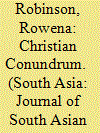

|
|
|
|
|
| Summary/Abstract |
The question of what constitutes the content of civility even as we seek to empty it of rigidly conceptualised Western understandings remains important. An interesting possibility is to reanimate the idea of civility with the notion of trust, but that again begs the question: ‘what is trust?’ My thinking on this subject is framed by constitutional values, and from that perspective, I perceive the ‘civility–trust’ dyad as being the social evocation or impression of the constitutional value of fraternity about which Ambedkar spoke in the Constituent Assembly. He suggested something of a content to fraternity which can then be employed to think through our understanding of civility. Against this backdrop, I listen to the voices of Tamil-speaking Dalit Christians and activists and the ways in which they try to come to terms with and struggle against the forms of incivility and ‘second-class’ citizenship they are up against, and how they make any sense of this with regard to constitutional values and Christian ones, both of which they should be able to lay claim to, but in which they are denied full participation.
|
|
|
|
|
|
|
|
|
|
|
|
|
|
|
|
| 2 |
ID:
149779
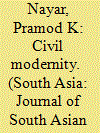

|
|
|
|
|
| Summary/Abstract |
This essay argues that etiquette books produced during the period 1880–1930 sought to contain the increasingly Westernised and cosmopolitan colonial subject by creating a regime of respectability and civility. These books formulated norms of social interaction, imparting advice on rational, hierarchic behaviour and cultural literacy. This discourse of civility was a mode of ameliorating the threat of the hybridised colonial subject by framing his cultural and social interactions within very particular modes of conduct while retaining the hierarchies necessary for imperial dominance.
|
|
|
|
|
|
|
|
|
|
|
|
|
|
|
|
| 3 |
ID:
106651
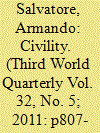

|
|
|
|
|
| Publication |
2011.
|
| Summary/Abstract |
This study explores the question of if and how associative bonds based on violence, control and self-restraint mediated by contractual relationships become institutionalised within societies and discusses the cultural factors that determine this threshold. It investigates the trade-off between formalised forms of interaction that safeguard individual rights and secure state control, and less formal modes of civility that deepen trans-state interconnectedness. It asks whether civility is the result of a global civilising process in the sense highlighted by Norbert Elias, whereby affect control is matched by formal norms guaranteed by legitimate institutions, or whether it is rather the much more complex constellation of specific actualisations of the more general trade-off as just defined. After summarising the current twists of the meaning of civility against the background of liberal and modernist precedents and delineating the alternative patterns of civility within Islamic, especially modern Ottoman, history, the analysis critically interrogates Weber's notion of Verbrüderung as the pre-modern root concept of organised forms of common action, mutual solidarity and civic participation. Finally, it questions whether this idea fits the historic forms of association in the Islamic world, in particular the privileging of a lower threshold of institutionalisation of the associational bond than has traditionally been found in the European experience-and which survives in the current anxieties about resurgent mahalle (neighbourhood) informal governance in the AKP's Turkey.
|
|
|
|
|
|
|
|
|
|
|
|
|
|
|
|
| 4 |
ID:
138452
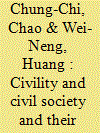

|
|
|
|
|
| Summary/Abstract |
This article examines the development of civil society and its relationship to democratisation in Taiwan. Civil society, through collective activities organised by civil groups, has been presumed to play a critical role in protecting citizens from the state’s overextended interference in people’s lives, which in turn safeguards their civil rights. This article proposes, however, that in Taiwan’s case, before citizens were allowed to organise civil associations, some intellectuals had already devoted themselves to the pursuit of democracy through their individual activities. Such activities transformed a political constraint into an opportunity structure, allowing civil society and democratisation to develop.
|
|
|
|
|
|
|
|
|
|
|
|
|
|
|
|
| 5 |
ID:
092204
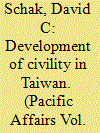

|
|
|
|
|
| Publication |
2009.
|
| Summary/Abstract |
Since the 1990s Taiwan has seen rapid and profound changes in public sphere deportment, labelled below as civility. Prior to that time, despite a government campaign beginning in the 1960s to improve public morality and behaviour, there was little if any change until democratization and the growth of civil society were underway. Aside from better treatment of strangers and caring for public spaces and facilities, the changes include identity shifts from subject to citizen and from belonging to a closed, primordial community to membership in the Taiwan polity, movements which empower minority political interests and benevolent government interactions with the populace. These changes indicate a democratization in Taiwan that has taken root not only at the government level but also at the grass roots.
|
|
|
|
|
|
|
|
|
|
|
|
|
|
|
|
| 6 |
ID:
106660
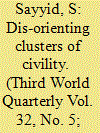

|
|
|
|
|
| Publication |
2011.
|
| Summary/Abstract |
Into what kind of narrative can we fit the recent eruption of the so-called `Arab street' into the public square? It is easy to argue that the reason why we are not certain what the story of the `Arab spring' is, is because it is too early to tell, and there is a degree of merit in this position; however, this simply defers rather than addresses the question. The problem with the recent popular mobilisations that swept many parts of Muslimistan is not purely empirical but rather conceptual. To tell a story presumes a language. Language is not itself a transparent medium, it does not just describe a pre-existing reality, it is also constitutive: it organises concepts, establishes relationships and networks, associations and dis-associations. The language that we use to apprehend the world around us is the residue of struggles of previous times; our vocabularies are crystallisations of specific historical confrontations and settlements. If our discourse (that is, both linguistic and extra-linguistic signifying practices) comes about as result of sedimented remains of historical struggles, then how can our discourse apprehend a world in which those historical forces are no longer in play?
|
|
|
|
|
|
|
|
|
|
|
|
|
|
|
|
| 7 |
ID:
148286
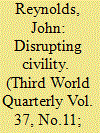

|
|
|
|
|
| Summary/Abstract |
This paper is a reflection on the role of intellectuals in engaging with Palestinian solidarity movements and liberation discourses, and on the place of international lawyers specifically within that context. The paper considers ‘the question of Palestine’ as a rigorous test for intellectuals in the Global North today, and examines particular debates over free speech, civility and balance that unfolded in the wake of Israel’s 2014 war on Gaza. It considers the interventions of international lawyers in these debates with reference to Edward Said’s ‘amateur’ and ‘professional’ intellectuals, and explores ways in which anti-colonial international lawyers (as amateur intellectuals) can transcend prevailing professional orthodoxies to deploy language, arguments or tactics that rupture liberal legal processes and narratives on Palestine.
|
|
|
|
|
|
|
|
|
|
|
|
|
|
|
|
| 8 |
ID:
117878
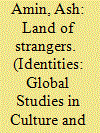

|
|
|
|
|
| Publication |
2013.
|
| Summary/Abstract |
This paper summarises a core theme running through the author's book Land of Strangers selected for discussion in this symposium. It examines the politics of intolerance towards minorities and migrants in multicultural and multiethnic Europe. It dissents from the prevailing view that this politics is symptomatic of a breakdown of social cohesion, in need of correctives of community, contact and border closure. Instead, the paper locates this development in a new 'catastrophist' biopolitics of risk and uncertainty that descends on the figure of the stranger, tapping into an ingrained vernacular of phenotypical racism. Accordingly, the paper argues for a politics of the commons that makes space for, and publicises, rituals of cohabitation, the shared commons, a welfarist biopolitics and other collective interventions that might strengthen civilities of indifference to difference.
|
|
|
|
|
|
|
|
|
|
|
|
|
|
|
|
| 9 |
ID:
053827
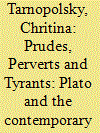

|
|
|
| 10 |
ID:
165935
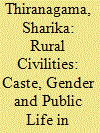

|
|
|
|
|
| Summary/Abstract |
This essay investigates how public life in Kerala is shaped by spatially distributed gendered caste practices. The essay first investigates rural publics, such as rural libraries, and suggests that forms of progressive civility in seemingly caste-free associational publics should be understood not as the elimination of caste practices but their reconstitution. Second, while it is commonly accepted that caste is naturally practised in the ‘private’, I suggest that these ‘privates’ are in fact what I call a ‘private–public’ and are spatially and socially shaped by gender and caste. I argue that ideas of civility and democracy need to understand experiences of forms of civility and incivility as constituted in private–publics rather than only in the formal associational public.
|
|
|
|
|
|
|
|
|
|
|
|
|
|
|
|
| 11 |
ID:
165934
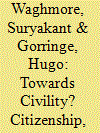

|
|
|
|
|
| Summary/Abstract |
Civility is generally lost in translation in non-Western contexts, and tends to be limited to its liberal form in the social sciences. To address this impasse of West versus East, individual versus community, and political versus civil society, we seek to recover the idea of civility. In this special section, we understand civility as socio-cultural processes and politics that challenge the lack of publicness and commitment to public life, equality and justice in society. We suggest that civility provides insights into the social life of democracy and the lived challenges to social democracy. The essays in this special section critically explore and engage with the paradox of high democracy and low civility that plagues India, where democratic consolidation translates into limited justice and minimal equality, along with increased exclusion and performative violence against marginal groups. The papers in this special section offer fine-grained and detailed analyses of social interactions across India. In doing so, they make a strong case for shifting from analyses of formal democracy and civil society toward the question of civility. Such a move enables us to explore justice, equality and emancipation as social processes, struggles and experiences rather than as preconditions for democratic societies.
|
|
|
|
|
|
|
|
|
|
|
|
|
|
|
|
| 12 |
ID:
117574
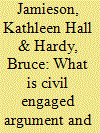

|
|
|
|
|
| Publication |
2012.
|
| Summary/Abstract |
To answer the question posed by the title of this article, we sketch what we mean by the concepts of civility and argument and engagement; note the ways in which the rise of partisan media menaces civil engaged argument; and close with analysis of an exchange between a prominent Democrat and Republican that illustrates the importance of common definitions and sources of trusted evidence.
|
|
|
|
|
|
|
|
|
|
|
|
|
|
|
|
|
|
|
|
|